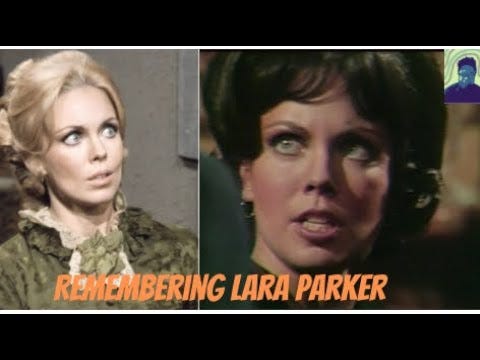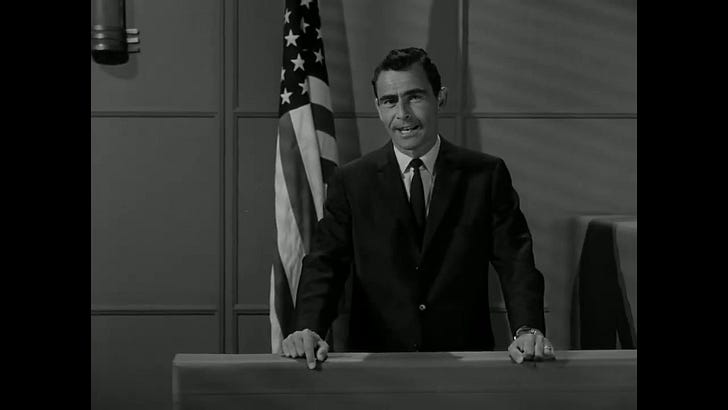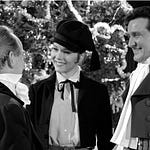Author and playwright Laramie Dean (Black Forest) joins me for The Play Typer Guy‘s Third Annual Halloween Special! Last year, we celebrated witchy women in media, including the weird sisters from Agatha All Along. This year, we’re discussing Laramie’s new novel, Haunt Me, Then, which he describes as “big gay Wuthering Heights.” It’s out now, and makes a swell holiday gift.
Please like, share, subscribe, and don’t borrow cars from werewolves.
Edited excerpts from our conversation below:
LARAMIE: Well, you know, it’s funny because I was never really into the Brontes. I know that you and I are both Dark Shadows fans, and the last Dark Shadows storyline was a huge ripoff of Wuthering Heights, and that might have contributed to my not being super into it.
And then I saw a poster for the 1939 film with Laurence Olivier. It was this really cool, green, spooky-looking poster, and I was like, oh, I want to watch that. I started watching it, and I thought, “You know what? This could translate really well to Montana. This could translate really well to gay. There could be monsters.”
I made it bigger and gayer and set in Montana in the ‘50s. Oh, and I threw in some of hitchcock’s Vertigo too because why not?
SER: I love Vertigo. I love thrillers of that style. And in Wuthering Heights, there’s the idea of staying in a spooky house overnight and someone telling you a story. I just love that framing device. It’s inherently spooky to me.
I enjoy the tension in the thriller, the stuff that Hitchcock did. We don’t see a lot of that now, but it’s something that works so well in fiction. There’s actually legitimately horrific stuff in [Haunt Me, Then], because that’s your jam, but you’re sort of touching on all the genres, which is kind of cool.
LARAMIE: Well, my first book, I kind of coined the term Montana Gothic. Southern Gothic is a big thing right now. People love it. Gothic Gothic is still a big thing. I love the Gothic book, gloomy and the creepy.
I grew up in a farmhouse in eastern Montana, which is basically the house where this novel takes place. It was so spooky and so far from anything. We’re 20 miles from the nearest town. Our neighbors were miles away. We were off of a road, like a highway that was not paved, and then another road that was even less paved to get down to our house.
And as I was watching this version of Wuthering Heights, I thought, gosh, this reminds me so much of the house where I grew up in the winter of ‘95, ‘96, when it was routinely 50, 60 below zero. Even without wind chill that winter, I think it was that cold. Now I think about how it would feel to be that isolated. I live in a town. I live in a city.
I don’t think I could do that as an adult. I don’t know how we did it when I was a kid. And it just seemed to lend itself to this story in Wuthering Heights. It’s Heathcliff and Catherine and their terrible, tortured, tumultuous love.
But yeah, Wuthering Heights opens with the Lockwood staying the night. then here comes Catherine and she’s clawing at the window and that’s one of the scariest things I can think of. That’s what bothered me so much about Stephen King’s Salem’s Lot was the vampires at the window when you’re in your bed and and you’re trying to sleep.
SER: The term “gothic” is thrown around a lot, gothic horror, gothic fiction... how would you define if you’re teaching it to your students or just lay people? What do you see as the pillars of gothic fiction?
LARAMIE: An obsession with the past, that’s really important the past needs to materialize in the present somehow or someone needs to be obsessed with the past. The traditional gothic has a house, preferably spooky preferably old, prreferably haunted or fake haunted.
There needs to be fear. There needs to be people having strong reactions to their surroundings, and of course, if it’s the ‘60s, if you’re looking at all those paperback gothics, there needs to be some young woman in a diaphanous gown holding a candle, running away from a house. There needs to be that element.
SER: A classic trope of gothic fiction is the house burning down. I feel like it happens in [V.C. Andrews’ Petals on the Wind], Rebecca …
LARAMIE: Yep. The Shining. It’s almost like the past is reaching out its bony, creepy fingers into the present. And the only way to stop it from doing that is to use the base element of fire to drive it back and to eradicate it as much as possible.
Even in The Haunting of Hill House, they don’t burn the house down. The house will stand forever, but they say it should be burned down in the ground, the ground sowed with salt.













